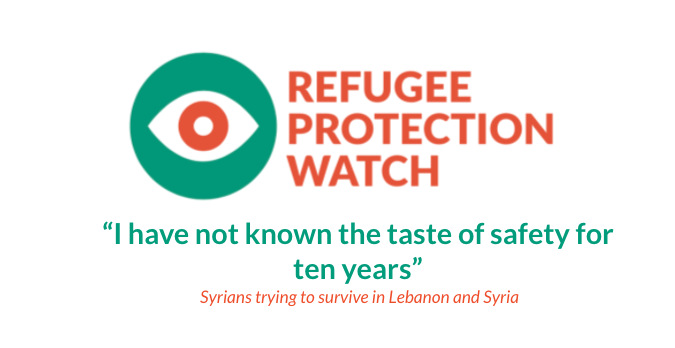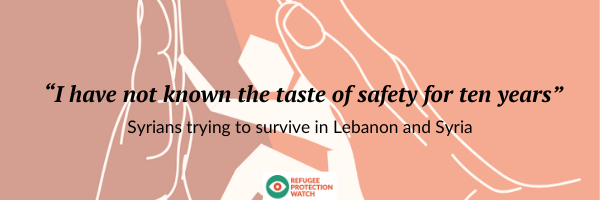[click image above or links below for full report]
Refugees returning to Syria are in danger, new study finds
- Syria remains seriously unsafe: UN-stipulated conditions for the safe return of refugees are far from being met
- Refugees often feel pushed to return home due to deteriorating conditions in Lebanon
- However, returnees often find conditions in Syria worse still, and re-return to Lebanon
Syrian refugees who return to Syria often find that life is harder, poorer, and more dangerous than they expected, a new report has shown that 70 percent fear that they themselves, a member of their family, or someone they know will be conscripted into the Damascus government’s Syrian Arab Army. Sixty percent of women are afraid to leave home after dark. Meanwhile, Syrians unable to find a dignified life in Lebanon or Syria are pushed toward irregular migration to Europe, sometimes leading to violent pushbacks by border guards.
The report, titled “I Have not Known the Taste of Safety for Ten Years” – Syrians Trying to Survive in Lebanon and Syria, was released by Refugee Protection Watch (RPW), a coalition of five organisations, which conducts research and advocacy on protection issues facing Syrian refugees and returnees. [1]
Yasmin Kayali, Co-Founder of Basmeh and Zeitooneh, a refugee-led organisation which is one of the five RPW coalition partners, said:
“Refugee Protection Watch’s findings are the latest evidence that Syria remains dangerous for refugees to return to, and that the UN’s stipulated conditions for the safe return of refugees are very far from being met. The international community must continue to host refugees, to ensure that better provisions are made for those who remain in Lebanon, and effectively monitor the welfare of returnees.
“While the UN is unable to monitor returnees and returnees themselves are unable to obtain basic information about conditions in Syria, external governments can hardly judge that Syria is safe”
Insecurity is widespread in Syria, with ongoing armed violence, crime, militia activity and state security agencies all constituting threats to the personal security of returnees. Between March and August 2021, the proportion of returnees able to purchase basic household necessities was just three in ten (29 per cent).
One man (37) who had returned to the governorate of Douma told researchers:
“They recently took one of my relatives for an unknown reason; they called him from the military detachment for a follow-up, he went but never returned.”
One woman (31) in Homs governorate told researchers:
“I am concerned about sexual violence or abuse, especially in the dark. So I never go out after sunset.”
The UN has stipulated 22 conditions that must be met before refugees can return safely to Syria. Reviewing those conditions, the report shows that Syria is a long way from being safe. It shows that: returnees do not feel safe, and many, particularly military-aged men, fear being arbitrarily detained. Unemployment, poverty and hunger are widespread, over three quarters of returnees are dependent on aid, and electricity, water and access to medical care are intermittent and unpredictable.
Among the other findings of the report were that:
- 26 percent of respondents in Syria stated that they either did not have enough information about the situation in Syria (when the respondents were still in Lebanon), or that the information they relied on when deciding to return turned out to be false. Meanwhile, only 28 percent of Syrian respondents in Lebanon stated that they have reliable information about their areas of origin in Syria.
- 63 percent of Syrian respondents reported that they knew someone who had re-returned to Lebanon from Syria – meaning these individuals returned to Syria, but then decided to come back to Lebanon once again. Economic hardship in Syria (38 percent), evasion of military service (31 percent), and harassment by security officials (26 percent) were among the reasons for their re-return.
- 40 percent of returnee respondents in Syria are thinking about leaving Syria again as soon as they can. In a similar vein.
- Just three percent of returnees had been followed up by UNHCR’s monitoring services, leaving the agency unable to vouch for the safety of the remainder.
- 72 percent of respondents in Lebanon stated that fear of deportation was one of their top concerns, while 71 per cent reported not having received any humanitarian assistance since January 2020, and 91 per cent reported feeling increased tension within their communities.
One man (39) told researchers:
“I returned to Ghouta as soon as the road was opened and the siege was lifted and found the situation to be different from how my relatives and friends had described it to me. When I met them and asked them about the reason, they told me they were scared to talk over the phone and tell me how bad the situation was.”
RPW therefore recommends that host nations in Europe and the Middle East maintain the position that Syria is not safe for return and not conduct forcible returns. Additionally, the EU should increase resettlement places for Syrian refugees and uphold the right to asylum. Localised funding for local Syrian and Lebanese organisations should be made available to improve conditions, and an international mechanism to monitor returns should be put in place.
DOWNLOAD THE FULL REPORT HERE
DOWNLOAD THE PRESENTATION SLIDES HERE



